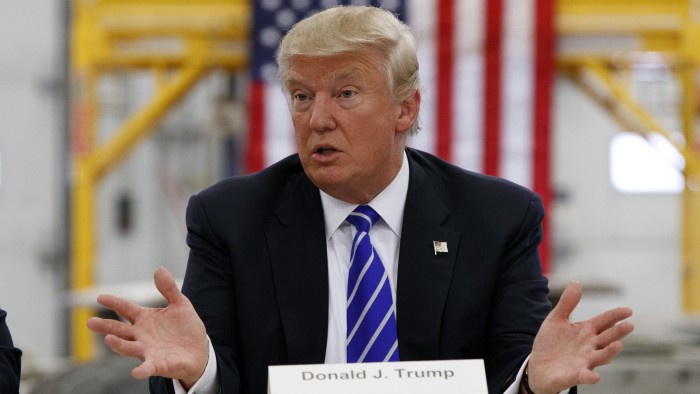Donald Trump’s campaign is harming US democracy

Roula Khalaf, Editor of the FT, selects her favourite stories in this weekly newsletter.
Donald Trump does not normally admit to self doubt. But in an interview with Time magazine this week, the Republican candidate for the US presidency admitted that he is unsure about what electoral strategy to adopt, ahead of November’s election. The Republican establishment is urging Mr Trump to adopt a more conventional and disciplined style of campaign. But Mr Trump himself told Time: “I’m liking the way I ran in the primaries better.”
The evidence is that Mr Trump is incapable of following the establishment’s advice to rein himself in. A relatively serious speech on economic policy this week was swiftly followed by a swing back to the wild paranoia of the primaries.
But the question of which campaign style is likely to prove more successful is one for Mr Trump and the Republican grandees to thrash out between themselves. There are much bigger issues at stake — above all, the health and future of American democracy.
The campaign style that Mr Trump pursued during the Republican primaries has already injected poison into American politics. The more he persists with it, the greater the damage he does to normal standards of civility and truthfulness in public life. American democracy should set a standard that the whole world aspires to. Mr Trump has debased public life in the US and set a dreadful example for his fellow citizens and to all those who look to the US as an example of political freedom in action.
What Mr Trump has done is to take the political discourse pioneered on the wilder fringes of talk radio and transfer it to the centre of American public life. Like a radio shock-jock, his political discourse is rife with conspiracy theories, paranoia and crackpot ideas, all underpinned by an unmistakable undercurrent of violence.
The torrent of paranoid nonsense pouring out of the Republican candidate is so relentless that it is worth pausing to recall some of the conspiracy theories that he has flirted with.
Mr Trump has suggested that the presidential election might be rigged; he has toyed with the idea that Antonin Scalia, a Supreme Court justice, was murdered; and he has implied that the father of Senator Ted Cruz was somehow involved in the murder of President John F Kennedy. This week, Mr Trump has said that President Barack Obama was “the founder of Isis”.
Most disturbingly of all, Mr Trump suggested this week that “the Second Amendment people” (by which he meant gun owners) could take action to prevent Hillary Clinton from stocking the US Supreme Court with liberal justices. To many people, this sounded like a suggestion that assassination might be the only way to stop Mrs Clinton from infringing the constitutional rights, claimed by the National Rifle Association and its adherents. But even if one accepts Mr Trump’s assurances that this was not what he meant, the Republican candidate was still using grossly irresponsible language, given America’s proliferation of guns and history of political violence. Many presidents, from Abraham Lincoln to Ronald Reagan, have been targeted by assassins. And there are any number of fringe loners in wider American society, who might take Mr Trump’s words as an incitement to violence.
Polling evidence shows that Mr Trump’s strategy is turning against him, as the Republican drops further behind Mrs Clinton in the polls. But there are still many weeks of this unpredictable campaign to run. And the sad truth is that the Trump campaign has already seriously damaged the quality and reputation of democracy in America.
Letters in response to this article:
Any democracy, even US, can fall victim to populism / From Richard Bartlett
The harm Trump has done will be temporary / From James Canales
Comments